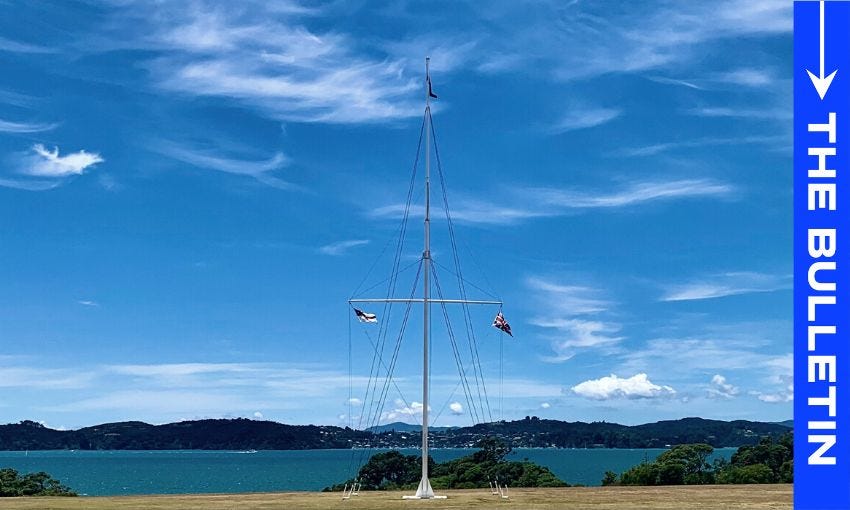The future of co-governance?
Less than a year ago, co-governance had a future, at least as potentially accepted terminology. Now some iwi leaders want the label removed and replaced
In today’s edition: James Shaw exits Wellington Central race; Foulden Maar saved; how Aotearoa can stop relying so heavily on agriculture to prop up our economy; but first, how co-governance became a confused and unwanted distraction
The flagpole at Waitangi (Image: Anna Rawhiti-Connell)
A question mark is added
On April 1 last year following the death of Moana Jackson, The Bulletin had exactly the same headline as today’s with one small but significant difference. There was no question mark. Co-governance had a future, at least as potentially accepted terminology. In less than a year, it’s become loaded with connotation, vitriol and conspiracy, and yet strangely rendered devoid of true meaning. Some iwi leaders, want the co-governance label removed as the means of expressing the modern interpretation of partnership between Māori and the Crown. Yesterday, the prime minister reiterated his view that the term lacked clarity.
The non-existent co-governance agenda
Ben Thomas was press secretary for former minister for Treaty of Waitangi negotiations, Chris Finlayson. In a column yesterday he says he wished he’d white-boarded a different name for “co-governance”, which he describes as a mechanism used in historical Treaty claims during the term of the last National government. It’s a good quip, but Thomas’s column is worth a full read as he catalogues how he thinks the term became tainted by confusion. Thomas is also unequivocal about the non-existence of a co-governance agenda within the current government. He calls the media out on using the phrase “co-governance agenda” when there isn’t one.
Co-governance and He Puapua are “unwanted distractions”
Ngarimu Blair is the deputy chair of the Ngāti Whātua Ōrākei Trust. In another piece worth your time, he writes that “co-governance and the “think-piece”, He Puapua, have been parked for now, as voter backlash looks for a home as the election draws near”, calling them “unwanted distractions to most hapū leaders who are simply trying to make the most of miserly Crown treaty settlements to deliver direct and rapid social impact for their people.”
Replace it with “partnership” or “mahi tahi”
Chris Hipkins will meet with the Iwi Chairs Forum today at Waitangi. Newsroom’s Jo Moir details his challenge as an unfamiliar face in the Far North As the Herald’s Audrey Patterson writes (paywalled), some iwi leaders will be asking Hipkins to get rid of the “co-governance” label and replace it with “partnership” or “mahi tahi.” Chairman of the Waikato-Tainui tribal executive, Tukoroirangi Morgan, said the narrative around co-governance had been badly handled and some people were paranoid about it. “Co-governance is a modern expression of partnership,” says Morgan. “This debate on co-governance is full of contradictions because there are a whole number of models in this country that in their own way amplify partnership,” he said citing the establishment of Kōhanga Reo as one example, and the establishment of charter schools or partnership schools by Act as another. Both were funded by the Crown and allowed Māori to educate their children in their own way.
The complicated journey to reclaim te reo Māori, again
Ramari Jackson-Paniora is the daughter of one of the main faces of the 1972 Māori Language Petition - but her relationship with te reo Māori is more complicated than people may assume. After reclaiming and losing her reo many times over her life, Jackson-Paniora is now on a new journey to find it again - but this time she’s taking that journey wrapped in a korowai of whānau support. Read more about her complicated lifelong journey with te reo Māori on The Spinoff now (sponsored).
James Shaw exits Wellington Central race
As Toby Manhire writes, just six days after five-term Wellington Central MP and finance minister Grant Robertson announced he would not be contesting the Wellington Central seat and would go list-only at this year’s election, Green party co-leader, James Shaw has followed suit. Shaw is now backing Wellington City Councillor Tamatha Paul to take his place telling Manhire he considers her “one of the most talented politicians of her generation.” and “I think she can win it.”
Foulden Maar saved
Dunedin city council has reached an agreement to save Foulden Maar from commercial mining. The maar is the site of a crater lake from 23 million years ago with the diatomite of the lake preserving fossils and a climate record covering 100,000 years from that period. It is fantastic news for Otago University palaeontologist Dr Nic Rawlence, who alongside many others, has been campaigning to save the maar. RNZ’s Farah Hancock deserves a shout here too. When Hancock was at Newsroom in 2019, she broke the story of the majority Malaysian-owned company that was planning on open-pit mining at Foulden Maar so they could make pig food. As Hancock noted at the time, the maar is the only one of its kind in the southern hemisphere.
The Spinoff's independent, homegrown journalism is only possible because of the support of our members. Their generous donations power all our work and help keep it freely available to all. Tautoko The Spinoff this year by becoming a member, making a new donation or encouraging your organisation to donate.
How venture capitalism can fund a greener economy
How does Aotearoa stop relying so heavily on agriculture to prop up our economy? Online tax and accounting service Hnry just raised $35m to grow its software on-demand service across the globe. In the latest episode of When the Facts Change, Bernard Hickey talks with AirTree partner Jackie Vullinghs about how venture capitalists are funding Aotearoa’s fastest growing, least-polluting and highest-wage export growth sector.
Click and collect
The policies you forgot (or never knew existed) that Chris Hipkins could kick down the road
The weather - rain continues to fall in already sodden areas while authorities have no idea how many people are currently homeless because of Auckland’s floods.
Strong 4.8 quake near Te Aroha rattles North Island
Investigation underway over concerns pokie trusts are cooking the books
Australia is ditching the monarch from one of its bank notes
Got some feedback about The Bulletin, or anything in the news? Get in touch with me at thebulletin@thespinoff.co.nz.
If you liked what you read today, share The Bulletin with friends, family and colleagues.
Chris Schulz says that for Auckland's schoolkids, this week feels eerily familiar. Don Rowe reports that an end is in sight for Australian ‘501’ deportations. Sam Brooks writes about how a gay All Black is a big deal. Shanti Mathias explains why it's important to properly clean your flood-soaked shoes. Claire Mabey browses the up-for-sale Fairfax Archives collection of photos of New Zealand writers.
It’s Friday so…
A bear in Boulder, Colorado took 400 selfies and they’re pretty good. Usually, animals walk past the wildlife cameras used by parks and conservation teams, but this bear is simply too beautiful. Funnier still are the commendations from “fashion pros” who have awarded plaudits like “the engagement is iconic, the confidence really comes through,” and “she’s really catching you, bringing you in, having direct eye contact to the camera … like she’s done it before.” We don’t actually know if the bear is male or female because, and I quote, “the bear did not take those kinds of selfies”.










